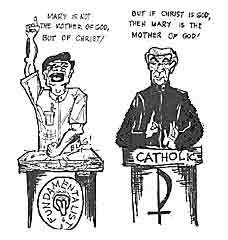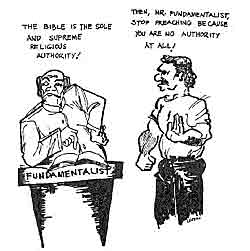

![]()
![]()
|
Newsletter of the District of Asia July-August 1999 Fundamentalism Q Why is it that Protestants and Fundamentalists are very critical of the veneration and honor given by Catholics to the Blessed Mother of Christ? A For several specious reasons. The first one is because, according to them, such honor has no foundation in the Bible. But, this allegation can stem only from a superficial reading of the Bible. Catholics in this matter follow the lead and example of God, who sent the Archangel Gabriel to greet the Blessed Virgin Mary on His part: “Hail, full of grace, the Lord is with thee: blessed art thou among women.” 1 Again, after the greeting by Elizabeth, “Blessed art thou among women and blessed is the fruit of thy womb.” Mary replied: “Because He hath regarded the humility of His handmaid: for behold from henceforth all generations shall call me blessed. Because He that is mighty hath done great things to me: and holy is his name.”2 We must bear in mind that these are Scriptural words, and if Scriptures are inspired, they must be taken as words of God. In them we find that the Blessed Virgin is blessed among women in a special manner and, because great things had been worked in her, the Holy Ghost has prophesied that all generations will call her “Blessed”. This speaks unfavorably of Protestants and Fundamentalists who, despite their claim to be Bible Christians, may not be so after all, because they do not regard or call her “Blessed”.
The rejection by Protestants and Fundamentalists of the title “Mother of God” given by Catholics to the Blessed Mother, on the ground that she was not the Mother of Christ’s Divine Nature, ignores the common usage of the human language. When someone asks, “Who was the mother of Dr. Jose Rizal?”, we answer: Doña Teodora Alonso”. And because Jose Rizal was a Filipino and a doctor, we rightfully say that Doña Teodora Alonzo was the “mother of a Filipino and a doctor”, even if she was not the mother of the Filipino race and of the science of Medicine. The Blessed Virgin Mary was the Mother of Christ, and since Christ is God, we can and should rightfully say that she was the “Mother of God’, even if she was not the mother of the divine nature of Christ.3
The second quotation, in which it appears that Christ was disowning His mother, was a masterful way on the part of Christ to exalt her the more, by telling the people that she was a Model with regard to obedience to the will of God and, thereby, more intimately close to Him, than from her mere physical motherhood. “And stretching forth his hand towards his disciples, he said: Behold my mother and my brethren.For whosoever shall do the will of my Father, that is in heaven, he is my brother, and sister, and mother.’ ”8 By way of last recourse, Evangelists and fundamentalists say: “There is no veneration of the Virgin Mary in heaven!” They say this on the basis of the book of Revelation of the Bible. We may admit that allegation, if the Evangelicals and Fundamentalists have already been in heaven and have witnessed what the Blessed are, or are not doing there, and if the book of Revelation is an account of what is being done or not being done in heaven. Unfortunately, no Evangelicals or Fundamentalists have already been in heaven and have been witnesses of the ongoings there. And the book of Revelation is not an account of what is done, or what is not done in heaven. There are others who say the same thing, like the Iglesia ni Kristo [“Church of Christ”, a Filipino Protestant sect – ed.], from their teaching that the souls of the departed are in their graves with their bodies awaiting for the resurrection and Universal Judgment. —————————– 1. Luke 1:28 2. Luke 1:48-49 3. It was the usage among Jews, since the time of Moses, not to call anyone “Lord” except Jahveh (Yahweh), their God. Even the Archangel Gabriel observed this usage when he told Mary: “And the Lord God shall give unto him the throne of David his father (…)” (Luke 1:32). Hence, when Elizabeth upon hearing the greeting of the Blessed Mother, exclaimed: “And whence is this to me that the mother of my Lord should come to me? (Luke 1, 43), Elizabeth equivalently called the Blessed Mother “Mother of my God”. 4. John 2:4 5. Matt. 12:47-48; Mark 3:32-33; Luke 8:15-20 6. John 19:26 7. See the commentary on John 2:4 (Marriage Feast at Cana) in the “A Catholic Commentary on Holy Scripture” - cf. Gospel of St. John, II 1-11, p. 983. 8. Matt. 12:48-50; Mark 3:34-35; Luke 8:12 |
 The
Protestants and Fundamentalists will insist: “But, Mary was just
an ordinary Jewish woman!” Not that ordinary, because she was
the Mother of Christ. Only to her has God, the Father, shared His
exclusive privilege, so that she could call Christ “Son”, truthfully
and rightfully. And only with regard to her did Christ, the incarnate
Son of God, accept to be duty bound as son to a mother. Again some
Fundamentalists say that, Catholics wrongly call Mary, “Mother of
God”, because she was not mother of Christ’s divine nature, but
only of His body or human nature. This has already been the reason
of the heresy of the Nestorians in the past, to reject the title
of the Blessed Mother as “Theotokos,” or bearer of God. The Third
General or Ecumenical Council of Ephesus, A.D. 431, condemned his
heresy and restored Mary’s title of “Theotokos”, the Greek term
meaning “Bearer of God”.
The
Protestants and Fundamentalists will insist: “But, Mary was just
an ordinary Jewish woman!” Not that ordinary, because she was
the Mother of Christ. Only to her has God, the Father, shared His
exclusive privilege, so that she could call Christ “Son”, truthfully
and rightfully. And only with regard to her did Christ, the incarnate
Son of God, accept to be duty bound as son to a mother. Again some
Fundamentalists say that, Catholics wrongly call Mary, “Mother of
God”, because she was not mother of Christ’s divine nature, but
only of His body or human nature. This has already been the reason
of the heresy of the Nestorians in the past, to reject the title
of the Blessed Mother as “Theotokos,” or bearer of God. The Third
General or Ecumenical Council of Ephesus, A.D. 431, condemned his
heresy and restored Mary’s title of “Theotokos”, the Greek term
meaning “Bearer of God”. Protestants
and Fundamentalists will insist: “Christ Himself did not show
special honor to Mary, e.g. when at the wedding feast of Cana, He
addressed her: ‘And Jesus saith to her: Woman, what is that to me
and to thee?’
Protestants
and Fundamentalists will insist: “Christ Himself did not show
special honor to Mary, e.g. when at the wedding feast of Cana, He
addressed her: ‘And Jesus saith to her: Woman, what is that to me
and to thee?’